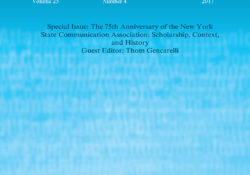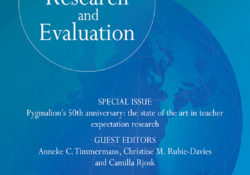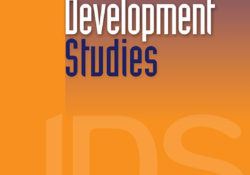eric.ed.gov har udgivet: “The Right Trajectory” brings to the forefront an often-overlooked voice in the debate about new state assessments developed in consortia: that of the best teachers in the country. This research suggests, despite challenges still to overcome, that these front-line experts believe that the new consortia tests are an improvement on the former assessments and so represent movement in the right direction for students and for education in their states. What do great teachers think of the new assessments compared to the previous ones? As part of state transitions to college and career ready (CCR) standards, including the Common Core State Standards in more than 40 states (NGA & CCSSO, 2010), states are for the first time administering new summative assessments aligned to those standards and aiming for… Continue Reading →
Like this:
Like Loading...
eric.ed.gov har udgivet: Timely, ongoing, and effective professional development for teachers and principals will be critical to the successful implementation of the Common Core State Standards (CCSS). These voluntary state-developed standards in mathematics and English language arts (ELA) outline the knowledge and skills that students in grades kindergarten through 12 are expected to learn to be prepared for college and careers. As of July 2013, the CCSS have been adopted in math and ELA by 45 states and the District of Columbia and by one additional state in ELA only. If teachers and principals are going to be prepared to help their students master the Common Core and pass the aligned assessments that will be ready in school year 2014-15, they will need professional development on various issues related to… Continue Reading →
Like this:
Like Loading...
eric.ed.gov har udgivet: Recent national and state standards of accountability have focused on increasing student performance and achievement as well as teacher quality. Included in this challenge is the issue of teacher compensation and how it has evolved with the efforts of providing quality instruction in order to improve the performance of students. Texas has developed and implemented innovative pay systems that focus on student achievement through the process of improving teacher quality. Most recently, the 79th Legislature of Texas passed House Bill One which funded the largest investment in teacher incentives with two teacher incentive programs that would provide $320 million annually to eligible school districts and campuses. This study focused on the Texas Educator Excellence Grant (TEEG) program which provided over $100 million annually to Texas’ most economically… Continue Reading →
Like this:
Like Loading...
eric.ed.gov har udgivet: Following a high-quality early care and pre-K experience, the kindergarten-through-third-grade years set the foundation upon which future learning builds; and strengthening this continuum creates opportunities for later success. Key components of a quality experience in K-3 include school readiness and transitions, kindergarten requirements, educator quality, prevention, intervention and assessments, and social and emotional learning and mental health. Education Commission of the States researched the policies and regulations that guide these key components in all 50 states to provide this comprehensive resource and many others. The data in this document show at least 20 states require some form of math knowledge for pre-service teacher candidates. Five additional states only require professional development in math for in-service teachers, with three states having requirements for both teacher candidates and current… Continue Reading →
Like this:
Like Loading...
tandfonline.com har udgivet en rapport under søgningen “Teacher Education Mathematics”: Link til kilde
Like this:
Like Loading...
eric.ed.gov har udgivet: Two decades after the United States was diagnosed as “a nation at risk,” academic standards for our primary and secondary schools are more important than ever?and their quality matters enormously. In 1983, as nearly every American knows, the National Commission on Excellence in Education declared that “The educational foundations of our society are presently being eroded by a rising tide of mediocrity that threatens our very future as a Nation and a people.” Test scores were falling, schools were asking less of students, international rankings were slipping, and colleges and employers were complaining that many high school graduates were semi-literate. America was gripped by an education crisis that centered on weak academic achievement in its K-12 schools. Though that weakness had myriad causes, policy makers, business leaders,… Continue Reading →
Like this:
Like Loading...
tandfonline.com har udgivet en rapport under søgningen “Teacher Education Mathematics”: Link til kilde
Like this:
Like Loading...
tandfonline.com har udgivet en rapport under søgningen “Teacher Education Mathematics”: Abstract Abstract The role of formal education in the reproduction of inequalities is well documented. Less clear is how this lens can be applied to a study of post-conflict state-building. The present study pairs policy analysis with student-centred ethnographic fieldwork to examine education policy in Rwanda. Since the end of the genocide, the government has staked its claim to legitimacy in delivering inclusive development. Its basic education policy is an entitlement programme with broad public support and designed to allow all children to attend primary and secondary school. Students found themselves caught up in a web of contradictions with important symbolic and material dimensions. They went to schools designed to improve access for the poor. But they were also poor… Continue Reading →
Like this:
Like Loading...
eric.ed.gov har udgivet: State laws and regulations can either help or hinder the ability of school districts to hire effective teachers for STEM (science, technology, engineering and mathematics) subjects. State officials wanting to tackle this critical problem need to begin with a thorough review of relevant policies, asking themselves: “Are we part of the problem, and how do we become part of the solution?” This report presents five steps that states can take to improve the quality and quantity of its K12 math and science teachers: (1) raise standards for what it takes to get into an education school; (2) improve the quality of undergraduate preparation; (3) recognize the need for creative and diverse solutions; (4) send qualified teachers to the schools that most need them; and (5) remember it… Continue Reading →
Like this:
Like Loading...
eric.ed.gov har udgivet: The Common Core State Standards (CCSS) represent a shift in the American education system. Included in the CCSS are opportunities for agriculture teachers to integrate math and English language arts content into their curriculum. Using the theory of planned behavior, we sought to identify Oregon agriculture teachers’ attitudes, familiarity with, current level of integration, and professional development needs related to the Common Core State Standards. Our research identified the majority of responding teachers were somewhat familiar with the CCSS. Additionally, teachers had varying levels of agreement that the CCSS would help their teaching, yet the majority of agriculture teachers in our study reported they had somewhat implemented the CCSS. In an effort to identify the professional development needs of teachers concerning these standards, we used the CCSS… Continue Reading →
Like this:
Like Loading...


